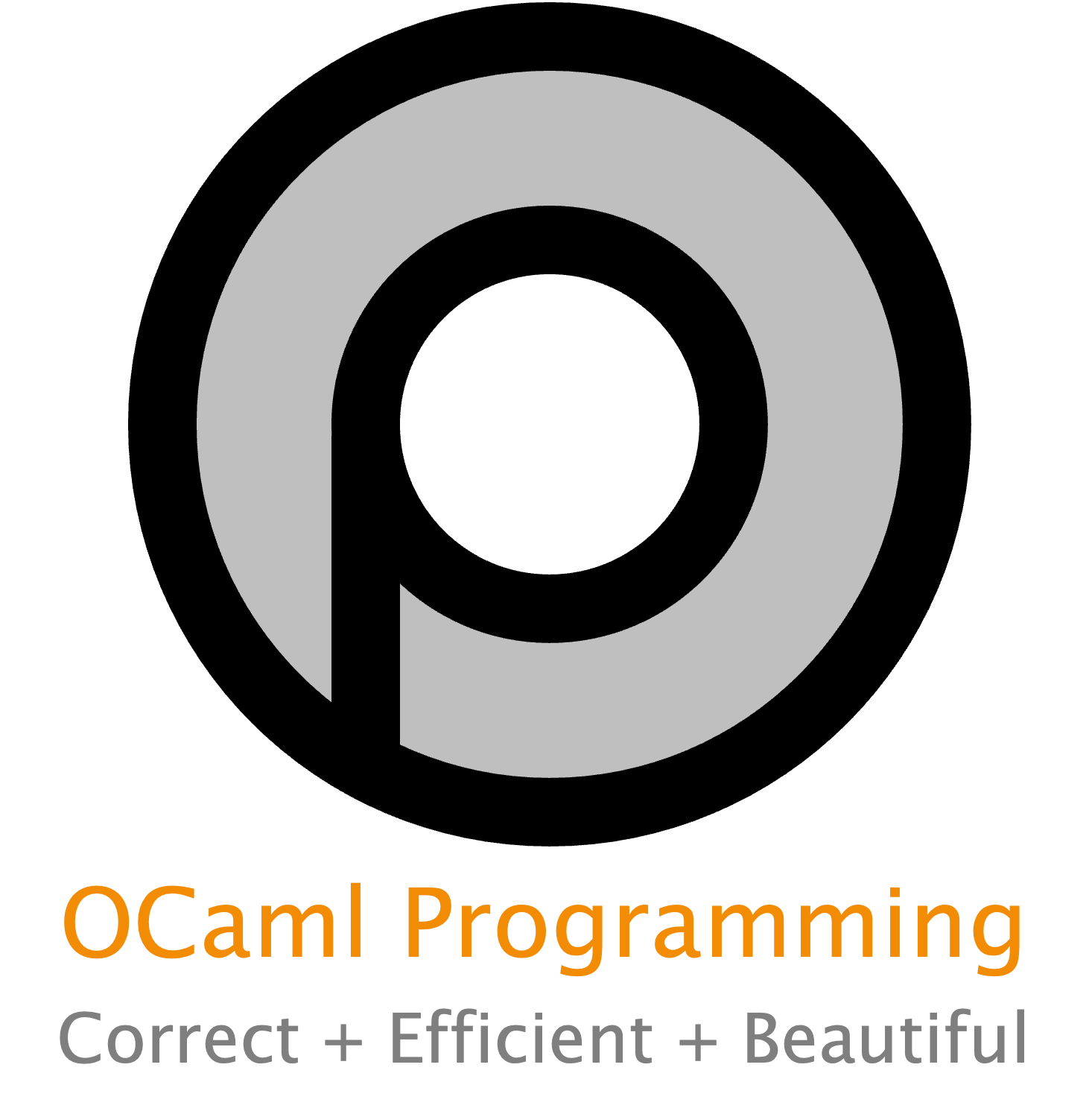3.5. Advanced Pattern Matching#
Here are some additional pattern forms that are useful:
p1 | ... | pn: an “or” pattern; matching against it succeeds if a match succeeds against any of the individual patternspi, which are tried in order from left to right. All the patterns must bind the same variables.(p : t): a pattern with an explicit type annotation.c: here,cmeans any constant, such as integer literals, string literals, and booleans.'ch1'..'ch2': here,chmeans a character literal. For example,'A'..'Z'matches any uppercase letter.p when e: matchespbut only ifeevaluates totrue.
You can read about all the pattern forms in the manual.
3.5.1. Pattern Matching with Let#
The syntax we’ve been using so far for let expressions is, in fact, a special case of the full syntax that OCaml permits. That syntax is:
let p = e1 in e2
That is, the left-hand side of the binding may in fact be a pattern, not just an identifier. Of course, variable identifiers are on our list of valid patterns, so that’s why the syntax we’ve studied so far is just a special case.
Given this syntax, we revisit the semantics of let expressions.
Dynamic semantics.
To evaluate let p = e1 in e2:
Evaluate
e1to a valuev1.Match
v1against patternp. If it doesn’t match, raise the exceptionMatch_failure. Otherwise, if it does match, it produces a set \(b\) of bindings.Substitute those bindings \(b\) in
e2, yielding a new expressione2'.Evaluate
e2'to a valuev2.The result of evaluating the let expression is
v2.
Static semantics.
If all the following hold then
(let p = e1 in e2) : t2:e1 : t1the pattern variables in
parex1..xne2 : t2under the assumption that for alliin1..nit holds thatxi : ti,
Let definitions.
As before, a let definition can be understood as a let expression whose body has not yet been given. So their syntax can be generalized to
let p = e
and their semantics follow from the semantics of let expressions, as before.
3.5.2. Pattern Matching with Functions#
The syntax we’ve been using so far for functions is also a special case of the full syntax that OCaml permits. That syntax is:
let f p1 ... pn = e1 in e2 (* function as part of let expression *)
let f p1 ... pn = e (* function definition at toplevel *)
fun p1 ... pn -> e (* anonymous function *)
The truly primitive syntactic form we need to care about is fun p -> e. Let’s
revisit the semantics of anonymous functions and their application with that
form; the changes to the other forms follow from those below:
Static semantics.
Let
x1..xnbe the pattern variables appearing inp. If by assuming thatx1 : t1andx2 : t2and … andxn : tn, we can conclude thatp : tande : u, thenfun p -> e : t -> u.The type checking rule for application is unchanged.
Dynamic semantics.
The evaluation rule for anonymous functions is unchanged.
To evaluate
e0 e1:Evaluate
e0to an anonymous functionfun p -> e, and evaluatee1to valuev1.Match
v1against patternp. If it doesn’t match, raise the exceptionMatch_failure. Otherwise, if it does match, it produces a set \(b\) of bindings.Substitute those bindings \(b\) in
e, yielding a new expressione'.Evaluate
e'to a valuev, which is the result of evaluatinge0 e1.
3.5.3. Pattern Matching Examples#
Here are several ways to get a Pokémon’s hit points:
(* Pokemon types *)
type ptype = TNormal | TFire | TWater
(* A record to represent Pokemon *)
type mon = { name : string; hp : int; ptype : ptype }
(* OK *)
let get_hp m = match m with { name = n; hp = h; ptype = t } -> h
(* better *)
let get_hp m = match m with { name = _; hp = h; ptype = _ } -> h
(* better *)
let get_hp m = match m with { name; hp; ptype } -> hp
(* better *)
let get_hp m = match m with { hp; _ } -> hp
(* best *)
let get_hp m = m.hp
type ptype = TNormal | TFire | TWater
type mon = { name : string; hp : int; ptype : ptype; }
val get_hp : mon -> int = <fun>
val get_hp : mon -> int = <fun>
val get_hp : mon -> int = <fun>
val get_hp : mon -> int = <fun>
val get_hp : mon -> int = <fun>
Here’s how to get the first and second components of a pair:
let fst (x, _) = x
let snd (_, y) = y
val fst : 'a * 'b -> 'a = <fun>
val snd : 'a * 'b -> 'b = <fun>
Both fst and snd are actually already defined for you in the standard
library.
Finally, here are several ways to get the 3rd component of a triple:
(* OK *)
let thrd t = match t with x, y, z -> z
(* good *)
let thrd t =
let x, y, z = t in
z
(* better *)
let thrd t =
let _, _, z = t in
z
(* best *)
let thrd (_, _, z) = z
val thrd : 'a * 'b * 'c -> 'c = <fun>
val thrd : 'a * 'b * 'c -> 'c = <fun>
val thrd : 'a * 'b * 'c -> 'c = <fun>
val thrd : 'a * 'b * 'c -> 'c = <fun>
The standard library does not define any functions for triples, quadruples, etc.

